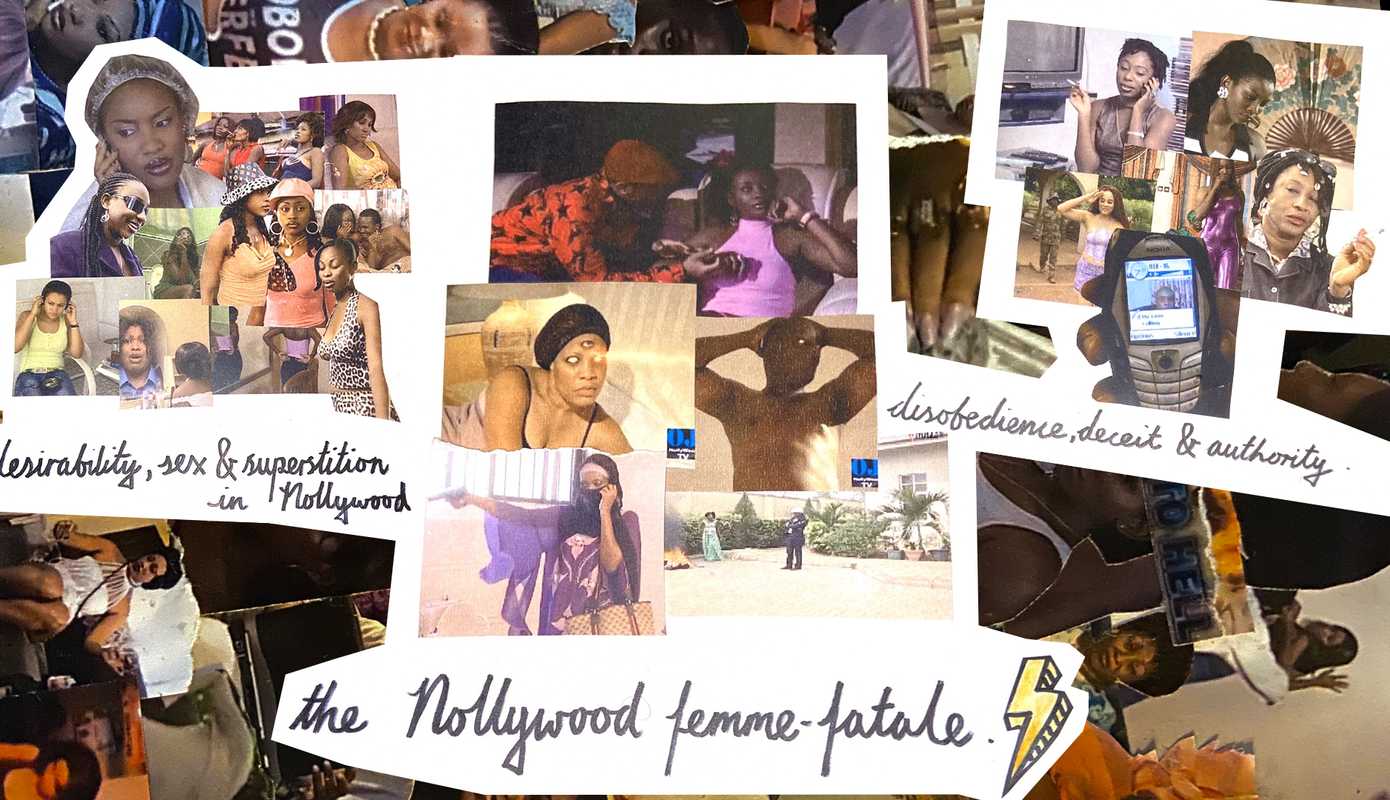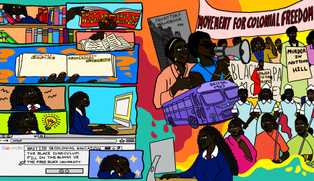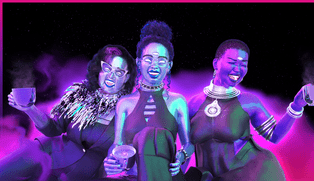This article was made possible by donations to the Black Creatives Fund. Donate now.
The birth of the @nolly.babes instagram account coincided with a cultural shift. Once viewed as crude and unworthy of attention, Nollywood films have exploded in popularity in the last few years, with old movies being given new life on digital platforms. Razz is cool now.
“When you think about what ‘razz’ really means, it means local, it means indigenous,” says Tochi, who runs @nolly.babes with her sister, Ebele. “Even beyond Nollywood, I think there’s been this wave of recognizing that – as Nigerians, as Africans – things that are indigenous to us and local to us are cool.”
Riding this wave of recognition, the @nolly.babes account brings Nigerian subcultures to a global audience through clips and stills from Nollywood films, condensing the complexities of Nigerian society into bite-size, accessible content.
Nigeria has always been sharply divided across class and regional lines, with the affluent middle and upper classes often seeking to separate themselves from the more working class ‘razz’ aesthetics seen in many Nollywood movies. This razz subculture created by the working class, once stigmatised, is now celebrated.
The first @nolly.babes post appeared in 2017, but Tochi and Ebele’s obsession with Nollywood films began long before. When I spoke with them by phone, Tochi did most of the talking while Ebele listened in.
“It started when we left Naij. We really missed being in Nigeria. So what would happen is we’d go to Lagos for the summer and buy literally hundreds of these [films] – back then it was VCD – then we’d pack them with us, and take them back to the States,” says Tochi. “We’d watch them when we were getting our hair done, we’d spend time together as a family watching them. It was something that allowed us to connect to our roots, even though we were in the diaspora.”
Before discovering @nolly.babes, I had underestimated the reach of Nollywood. I had never considered that these movies I knew were being watched beyond Nigeria’s borders and across the Black diaspora. But when they moved to the US, Tochi remembers meeting friends from Dominica, Haiti and Puerto Rico who grew up watching the same Nollywood movies she had.
It isn’t surprising that Nollywood’s influence transcends borders. Its reach is fuelled by the fact that the films tackle universal human themes, just within a West African context. Themes like reputation, jealousy, and love are incredibly relatable, and this is Nollywood’s appeal.
“I think it’s also just Black entertainment,” suggests Tochi. “It’s Black people doing what we do best: dressing amazingly, giving you one-liners. Blackness is excellent. And Nollywood, in its own unique way, is a reflection of that.”

But Nollywood also reflects a society where male desires and anxieties are the center of the universe, and women appear as one of a limited range of stock characters.
“When it comes to women’s identity, people like to just take shortcuts. It’s either you’re good or you’re bad. You hardly ever see a woman in a Nollywood movie with complexity to her.”
Nollywood’s misogyny is unsurprising for Nigerian viewers. Nigerian culture holds women to a high moral standard, constantly critiquing their appearance or choices while denying them empowerment and respect. These real life moral judgements, designed to provoke shame, are transferred to the big screen.
“What it means to be a good woman is very specific. You’re subservient to your husband. If your husband goes out and cheats on you? The good wife is the one that stays,” Tochi explains. “Bad girls have the bold, blonde hair. In fact, don’t even have blonde hair if you want to be a good woman in Nollywood.” Ebele laughs.
Any dedicated Nollywood fan will tell you that most films end badly for women who dare to display non-conformity or power. In 1994’s iconic Nneka the Pretty Serpent, the mystical control Nneka wields over men is overturned at the end when she is confronted by men who invoke Christian righteousness and overpower her magic, killing her. The fear that she inspires in audiences is wrapped up in her power as much as it is in her traditional spirituality.
Tochi lists things that women can be punished for on screen. “The sexually liberated woman? The financially independent woman? She ends up going through turmoil. A woman bringing in more income than her husband? At the end of the movie, you see her in turmoil.”
Still, the beauty of Nollywood is that before a movie’s plot undermines the power of these women, we get to see them flourish on screen. These are the moments that populate the @nolly.babes account. “Even though these unconventional women end up in compromised situations or you know, they meet their demise at the end of the movie, I’ll get to see a good hour or two of these women living life, showcasing their energy and the best outfits they have,” says Tochi.
The appeal of @nolly.babes lies in the curatorial genius of Tochi and Ebele. They are cultural connoisseurs, adept at selecting striking stills and scenes that are pure entertainment for the Instagram scroller. They are especially good at finding content that displays Nollywood women in their element. “We’re asking for all different types of women – different sizes, different shades, different colors, different socioeconomic backgrounds,” says Tochi, “and Old Nollywood provides plenty of that.”
The sisters source a lot of their content from what Tochi describes as the “golden age of Nollywood, where every other scene could be a clip. Every other scene is noteworthy to screenshot and it’s beautiful.”
There is a notable difference between the Old Nollywood movies made in the early 90s and 2000s compared to those made today, which tend to be Westernised. “These days it almost seems like I don’t even know who the big current Nigerian actresses are,” Tochi says, “because I feel like they are all just bundles of the same hair and the same makeup and the same contouring.”
She brings up the example of The Wedding Party, a 2016 rom-com. “I mean, let’s talk about the fact that the movie featured a light-skinned virgin and a dark skinned hyper-sexual woman. We’re dealing with stereotypical characters, and you’re not even giving me the juice that I’m getting from an Old Nollywood movie like Blood Sisters?”
Released in 2003, Blood Sisters stars Nollywood legends like Genevieve Nnaji, Omotola and Patience Ozokwor. The domestic drama follows the story of a widowed mother and her two daughters, and is filled with moral anxieties over female sexuality, characterised by sibling rivalry, jealousy and parental panic. Igbo culture underpins the narrative through the movie’s soundtrack, and its inclusion of customs like village elders sharing the kola nut.
Blood Sisters is an Old Nollywood favourite of Tochi and Ebele. “It’s an example of sticking to your roots and exhibiting Black excellence at the same time. We are Igbo. Historically, our people are renowned storytellers, like Chinua Achebe. Our style of telling stories, telling plots, our oral histories, you could see that shine through in Old Nollywood. I can still quote that era of movies; they don’t age. And they’re still relevant today.”

Growing up in Lagos, I was conditioned to see Nollywood movies as taboo. In salons, when Nollywood movies were on and I became engrossed, I’d often be scolded by older women, fellow customers who would ask if my mother knew I was watching such things. This taboo has a lot to do with the idea of high art and low art. Past generations of Nigerians were rewarded for their ability to distance themselves from things that were ‘African’, and instead to connect to the Western world. Luckily this is changing, as African creators become more prevalent on the global stage.
“Unfortunately people assume that because something originates in Nigeria, it’s of less quality than its Western counterpart,” Tochi says. “Our dad is a collector of art, specifically Nigerian art, so we have always been exposed to it. We count ourselves lucky because our upbringing has influenced how we view Nollywood movies. We’re able to appreciate them in a way that people weren’t necessarily open to when it was considered ‘razz’.”
Nigeria’s youth are reclaiming this stigmatised cultural context and keeping it fresh. In Lagos last year, the Nolly Babes themed party at Nok by Alara was a crowd pleaser. The event celebrated all things Nollywood and people came dressed to impress, the razzer the better.
“It boils down to our identity, and us being able to appreciate the things that we make,” says Tochi. “And yes, they are different to Western standards. But Nollywood movies do have value and they are our creations. They are us.”





